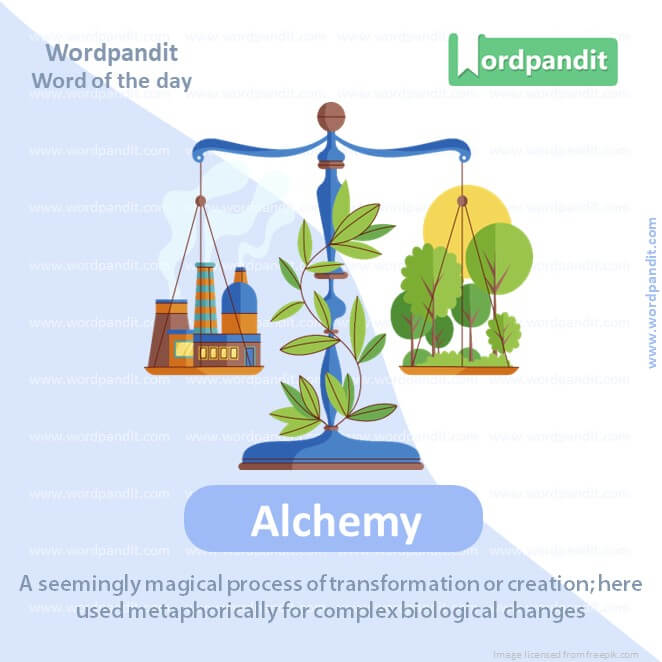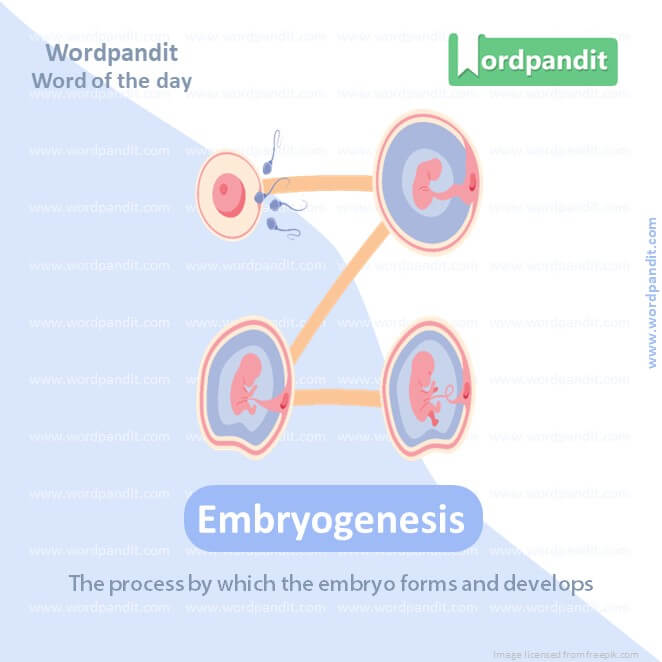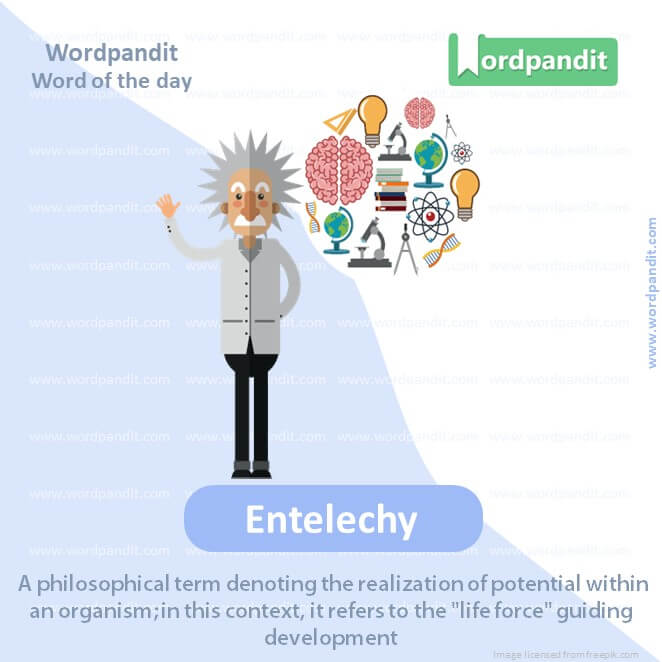Daily Vocabulary Words: List of Daily Used Words in Leading Indian Newspapers
Hi there. Welcome to this special section @ Wordpandit. Our endeavour here is straightforward: highlighting daily vocabulary words that you would come across in leading newspapers in the country. We have included the following newspapers in our selection:
• The Times of India
• The Economic Times
• Hindustan Times
• Mint
• Indian Express
We are putting in extensive work to develop your vocabulary. All you have to do is be regular with this section and check out this post daily. This is your repository of commonly used words; essentially, we are posting a list of daily used words. Hence, this has significant practical application as it teaches you words that are commonly used in leading publications mentioned above.
Visit the website daily to learn words from leading Indian newspapers.

WORD-1: ALCHEMY
CONTEXT: In a revival of ancient practices, many are turning to alchemy to create medicinal remedies that derive fundamental elements from nature.
SOURCE: The Times of India
EXPLANATORY PARAGRAPH: Imagine if you had a magic trick to turn a regular metal, like a spoon, into gold. A long time ago, people believed in something called alchemy. They thought they could use special ways to change regular things into gold or find a drink that makes them live forever. Today, we know it doesn’t work like that, but we still use the word to talk about mysterious or magical changes.
MEANING: A seemingly magical process of transformation or creation; here used metaphorically for complex biological changes (noun).
PRONUNCIATION: al-kuh-mee
SYNONYMS: Magic, sorcery, wizardry, enchantment, spellwork, mysticism, occultism
USAGE EXAMPLES:
1. The chef’s ability to combine flavors was like culinary alchemy.
2. Many scientists in the past believed in the power of alchemy.
3. The transformation of the room was pure alchemy.
4. Alchemy was an important study in the Middle Ages.

WORD-2: EMBRYOGENESIS
CONTEXT: Remarkably, our current understanding of embryogenesis stems from intensive studies in model organisms.
SOURCE: Hindustan Times
EXPLANATORY PARAGRAPH: Imagine a tiny seed growing into a big, strong tree. Similarly, there’s a process where a tiny cell grows and forms a baby inside its mommy’s tummy. This amazing journey is called embryogenesis.
MEANING: The process by which an embryo forms and develops (noun).
PRONUNCIATION: em-bree-o-jen-uh-sis
SYNONYMS: Development, formation, generation, creation, inception, beginning, origination
USAGE EXAMPLES:
1. Scientists study embryogenesis to understand how life begins.
2. Embryogenesis in frogs is often studied in biology classes.
3. Various factors can influence the process of embryogenesis.
4. The stages of embryogenesis are intricate and complex.

WORD-3: ENTELECHY
CONTEXT: The painting exhibition at National Modern Art Gallery captured the entelechy of Indian art. The spirit and inborn potential of the artists were evident in their oeuvres.
SOURCE: Indian Express
EXPLANATORY PARAGRAPH: Imagine a caterpillar turning into a butterfly. That butterfly was always inside the caterpillar, just waiting for the right time to come out. Entelechy is like the special power or plan inside things that helps them become the best version of themselves.
MEANING: A philosophical term denoting the realization of potential within an organism; in this context, it refers to the “life force” guiding development (noun).
PRONUNCIATION: en-TEL-uh-kee
SYNONYMS: Potential, essence, inner purpose, realization, actualization, fulfilment, destiny
USAGE EXAMPLES:
1. The entelechy of the acorn is to become an oak tree.
2. He believed that everyone had an entelechy guiding them.
3. The transformation from tadpole to frog showcases nature’s entelechy.
4. Discovering one’s entelechy can be a lifelong journey.

WORD-4: THERMODYNAMIC
CONTEXT: The concept of thermodynamics is fundamental to understanding energy harvesting strategies that aim to mitigate the impact of harmful emissions on our environment.
SOURCE: The Economic Times
EXPLANATORY PARAGRAPH: Think about when you feel hot or cold. These feelings are because of something called energy. Thermodynamic is a word that talks about how energy, especially heat, moves and changes. Like when you put ice cream under the sun, it melts because of the heat energy.
MEANING: Relating to the movement and conversion of thermal energy (adjective).
PRONUNCIATION: thur-mo-dy-NAM-ik
SYNONYMS: Thermal, calorific, heat-related, energetic, temperature-based, kinetic, dynamic
USAGE EXAMPLES:
1. The thermodynamic properties of water make it essential for life.
2. Engineers study thermodynamic principles to design engines.
3. The thermodynamic process in a refrigerator keeps our food cold.
4. The sun plays a key role in the Earth’s thermodynamic balance.

WORD-5: TRANSCENDENT
CONTEXT: In a recent column, scholars discussed the transcendent nature of music and dance in India and its power to unite people beyond barriers.
SOURCE: The Times of India
EXPLANATORY PARAGRAPH: Imagine seeing something so beautiful, like a rainbow or stars, that it feels like magic. Transcendent means something is so amazing, it seems above and beyond our regular world.
MEANING: Going beyond ordinary limits; exceeding; surpassing; excelling (adjective).
PRONUNCIATION: tran-SEN-dent
SYNONYMS: Extraordinary, supreme, surpassing, exceptional, elevated, superior, divine
USAGE EXAMPLES:
1. The view from the mountain was truly transcendent.
2. Her performance was transcendent and captivated everyone.
3. The artwork had a transcendent beauty.
4. The story of his journey was nothing short of transcendent.
WORD-6: APHOISM
CONTEXT: The author’s aphorism on life and love enchanted his readers, showing the depth of his wisdom and perception.
SOURCE: Indian Express
EXPLANATORY PARAGRAPH: An aphoism is like a tiny piece of wisdom or truth wrapped up in just a few words. It’s like when someone tells you a small but powerful thing that makes you think a lot.
MEANING: A short, pointed sentence expressing a wise or clever observation (noun).
PRONUNCIATION: AF-oh-izm
SYNONYMS: Saying, adage, maxim, proverb, motto, axiom, epigram
USAGE EXAMPLES:
1. “Less is more” is a popular aphoism.
2. He had a habit of starting his speeches with an aphoism.
3. The book was filled with ancient aphoisms.
4. Her grandmother always had an aphoism for every situation.
WORD-7: AUSTERITY
CONTEXT: In its annual budget presentation, the government emphasized austerity to alleviate fiscal pressures and reinforce economic stability.
SOURCE: Mint
EXPLANATORY PARAGRAPH: Think of when you have to save your candies and not eat them all at once, even if you really want to. Austerity is when people or even whole countries decide to be very careful with their money and resources, often because they need to save.
MEANING: Sternness or severity in manner or attitude; a condition of simple and plain living (noun).
PRONUNCIATION: aw-STER-i-tee
SYNONYMS: Simplicity, severity, strictness, frugality, thrift, sobriety, asceticism
USAGE EXAMPLES:
1. The country introduced austerity measures to improve the economy.
2. She lived with an admirable sense of austerity and simplicity.
3. The austerity of the desert landscape was breathtaking.
4. The government’s austerity plan was met with protests.
WORD-8: ABROGATE
CONTEXT: In an audacious move, the parliament decided to abrogate the controversial law, leading to widespread discussions in the country’s political landscape.
SOURCE: The Economic Times
EXPLANATORY PARAGRAPH: Imagine you have a rule at home that you cannot eat cookies before dinner. But one day, your parents decide that rule doesn’t exist anymore. When a rule or law is taken away like that, it’s called “abrogate.”
MEANING: To officially end or cancel a law, rule, or agreement (verb).
PRONUNCIATION: AB-roh-gate
SYNONYMS: Cancel, abolish, annul, revoke, repeal, nullify, terminate
USAGE EXAMPLES:
1. The treaty was abrogated by the two countries.
2. The company can abrogate the contract if certain conditions are not met.
3. The new government promised to abrogate old, outdated laws.
4. The council had the authority to abrogate decisions made by the committee.
WORD-9: EXODUS
CONTEXT: The massive exodus of city dwellers to regions with improved quality of life indicates a fascinating urban-to-rural migration trend.
SOURCE: Hindustan Times
EXPLANATORY PARAGRAPH: Imagine all the birds in a park suddenly flying away together to a new place. This big movement of a lot of people or things from one place to another is called an “exodus.”
MEANING: A mass departure of people (noun).
PRONUNCIATION: EX-uh-dus
SYNONYMS: Departure, migration, leaving, retreat, evacuation, flight, emigration
USAGE EXAMPLES:
1. There was a major exodus from the city during the hurricane warning.
2. The end of the school year saw an exodus of students heading to their hometowns.
3. The story of the Exodus recounts the Israelites’ escape from Egypt.
4. Economic challenges caused an exodus of skilled workers from the country.
WORD-10: NAUGHT
CONTEXT: Eyeing the armies opposing him, the king realized that his hopes of victory were naught, and that a drastic strategy was required.
SOURCE: Indian Express
EXPLANATORY PARAGRAPH: Imagine you have a bag of candies and someone asks you how many you have, but you’ve eaten them all. So, you have zero candies. “Naught” is a fancy way of saying “zero” or “nothing.”
MEANING: Nothing; zero (noun).
PRONUNCIATION: Nawt
SYNONYMS: Zero, nil, nothing, none, zilch, void, empty
USAGE EXAMPLES:
1. All his efforts came to naught when the project was canceled.
2. She feared her dreams would amount to naught.
3. After all the calculations, the result was naught.
4. He left the game with a score of naught.
Vocabulary Daily Words
Among the myriad aspects of language learning, the role of ‘vocabulary daily words’ attests to their undeniable importance. These everyday words form the bedrock of communication. Whether used in casual chat or formal discussion, the fluency and understanding of ‘vocabulary daily words’ can significantly uplift the quality of interaction. However, the vital question is, how to effectively learn these ‘vocabulary daily words’?
The crux of learning ‘vocabulary daily words’ lies in a well-rounded approach that encompasses exposure, understanding, memorization, and practice. Rote memorization might seem like a quick solution, but it lacks context and, thereby, retention. Hence, opt for a diverse range of resources like books, newspapers, podcasts, and digital media. These will bring ‘vocabulary daily words’ to life, providing real-life usage examples and making the learning process inherently engaging.
Next, using memory-enhancing techniques can significantly improve retention of ‘vocabulary daily words’. Techniques such as flashcards or the Leitner System align with the principles of spaced repetition, allowing more effective and long-term learning. Incorporating mnemonic devices, associating new words with unique stories or images, can further facilitate this learning process.
The key to fully grasping ‘vocabulary daily words’ lies in practical usage. Make it a habit to use these words in your daily communications. Whether it’s a friendly conversation, a professional email, or a social media post, try integrating these new words. Doing so provides hands-on practice, strengthening your comprehension and application of these words.
In a nutshell, ‘vocabulary daily words’ are a treasure in the language learning landscape. By harnessing diversified resources, utilizing memory techniques, and actively using these words, your grip on the ‘vocabulary daily words’ will strengthen significantly. So, turn the pages, hit play, start a conversation, and let these ‘vocabulary daily words’ shape the story of your linguistic journey.













